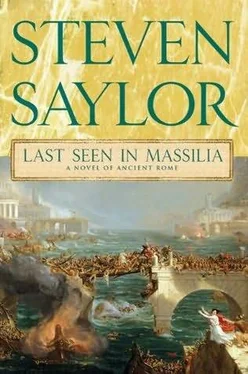Steven Saylor - Last seen in Massilia
Здесь есть возможность читать онлайн «Steven Saylor - Last seen in Massilia» весь текст электронной книги совершенно бесплатно (целиком полную версию без сокращений). В некоторых случаях можно слушать аудио, скачать через торрент в формате fb2 и присутствует краткое содержание. Жанр: Исторический детектив, на английском языке. Описание произведения, (предисловие) а так же отзывы посетителей доступны на портале библиотеки ЛибКат.
- Название:Last seen in Massilia
- Автор:
- Жанр:
- Год:неизвестен
- ISBN:нет данных
- Рейтинг книги:3 / 5. Голосов: 1
-
Избранное:Добавить в избранное
- Отзывы:
-
Ваша оценка:
- 60
- 1
- 2
- 3
- 4
- 5
Last seen in Massilia: краткое содержание, описание и аннотация
Предлагаем к чтению аннотацию, описание, краткое содержание или предисловие (зависит от того, что написал сам автор книги «Last seen in Massilia»). Если вы не нашли необходимую информацию о книге — напишите в комментариях, мы постараемся отыскать её.
Last seen in Massilia — читать онлайн бесплатно полную книгу (весь текст) целиком
Ниже представлен текст книги, разбитый по страницам. Система сохранения места последней прочитанной страницы, позволяет с удобством читать онлайн бесплатно книгу «Last seen in Massilia», без необходимости каждый раз заново искать на чём Вы остановились. Поставьте закладку, и сможете в любой момент перейти на страницу, на которой закончили чтение.
Интервал:
Закладка:
Despite all this, I slept; and for better or worse, Hypnos sent me no dreams.
I awoke with the sensation that someone had been watching me while I slept and had just left the room. The sensation was so powerful that I bolted upright, instantly awake. The room was empty. It must have been Meto, I thought. But why had he not awakened me? Perhaps I had only been dreaming, after all…
A moment later, Davus stepped into the room. "Finally, you're awake! You'll want to hurry out of bed. Something's happening down at the city gates. Something big!"
I rubbed my eyes. "Davus, were you just in this room… watching me?"
"No."
"Was someone else just in this room?"
He frowned and put his hands on his hips. "I don't know. I was over in the next room, out on the balcony, watching all the people heading down toward the city gates. Someone might have come in here from the anteroom and the hallway outside, and I wouldn't have seen them…"
I blinked. "Is it still raining?"
"No. The storm lasted all night, but now it's over. There's a blue sky and bright sunshine. But what's this?" He let out a cry of delight and rushed to a little tripod table in the corner. "Figs! A whole pile of figs! I couldn't find a scrap of food anywhere last night. I hardly slept at all, I was so hungry. But look at these! They're beautiful. So dark and plump. And the smell! Here, have one. Then we'll head down to the gates."
Davus bit into a fig and laughed with delight. Until I ventured to take a small bite, I hadn't realized just how hungry I was. The sheer pleasure of it overwhelmed me. It was the best fig I had ever tasted.
No starving slave could have been trusted to leave that pile of figs for a sleeping man; the slave would have devoured them. Meto himself must have left them for us, I decided. But why had he not awakened me? Why had he left without a word?
A great crowd had gathered at the city gates. A cordon of soldiers with upright spears held back the throng and kept clear a wide passage from the gates to the center of the market square.
The people around us looked weary, hungry and miserable, but their eyes gleamed with anticipation. For months they had waited, dreaded, hoped. Now, at last, in the next few moments, something would happen. Would they be forgiven and fed by their new master-or cruelly slaughtered? They seemed hardly to care which fate awaited them as long as something put an end to their suspense.
Every crowd makes its own peculiar noise. This one sounded like the a field of tall grass on a breezy day, swaying and hissing in the wind. People spoke constantly, nervously, but never above a whisper. Like fickle winds, hushed rumors of imminent doom and deliverance flitted this way and that through the crowd.
Like everyone else, I found myself staring fixedly at the gates. The great bronze doors stood intact, as did the flanking towers, but only a few steps away gaped the huge breach in the wall, with great piles of rubble strewn about, including the remains of a bastion tower lying on its side. The breach had the strange effect of making the gates look as if they were merely a prop. A theatrical facade may have doors and windows and balconies, but only masquerades as a house or a temple. Just so, the gates of Massilia did not seem really to be gates at all, but only a convincing imitation. What function does a gate possess when the wall nearby has a gap in it large enough to admit a stampeding herd of elephants?
And yet, all eyes were on the gates. When trumpeters atop the flanking towers blasted a fanfare and the great bronze doors parted with a clang, every voice fell silent.
Months ago, the gates had been closed to Caesar. They had remained barred ever since. Now, with a great deal of creaking, they slowly swung outward until they stood wide open. Around me I heard sighs and weeping. The breaching of the wall had been an unimaginable disaster, but for the gates to be opened to the enemy was a disaster of even greater magnitude. Massilia had not merely been bested; the proud city that had stood independent for five hundred years had now surrendered herself to a conqueror.
Roman soldiers marched through the gates. No one could have been surprised, yet the crowd still gave a collective shudder and a gasp. There were scattered screams. Men and women fainted.
The first Romans to pass through the gates fell out of rank and took the places of the Massilian soldiers lining that end of the cordon; the Massilians threw down their spears and tramped out of the gates, giving themselves up. The next rank of marching Romans took the places of the Massilians farther up the cordon, and so on. This ceremonial replacement continued in an orderly fashion until not a Massilian soldier was left. Romans now made up the cordon that held back the crowd, and the broad passage from the gateway to the center of the square was littered with discarded spears.
There was another blast from the trumpets. Trebonius came riding in on horseback, accompanied by his officers. Among them I recognized the engineer Vitruvius, who kept looking over his shoulder and peering at the breach in the wall, more interested in Massilia's failed ramparts than in her conquered people.
A few people cheered halfheartedly. Their uncertainty prompted scattered laughter. The mood of the crowd was tense. Trebonius scowled.
If the gates of Massilia seemed an overwrought theatrical facade, then Caesar's arrival was like that of a deus ex machina. Had he been lifted down from the sky by a crane, literally like a god at the climax of a drama, the effect on the crowd could hardly have been more stunning. A white charger cantered through the gates, and upon it sat a figure wearing a golden breastplate that gleamed in the sunlight. His bright crimson cape was thrown behind him. His balding head was bare and his red-crested helmet was tucked under one arm, as if to demonstrate that he was unafraid to show his face to men and gods alike; for though the gods might have turned a blind eye to Massilia in the preceding months, who could doubt that they were watching now?
Caesar reached the clearing at the center of the marketplace, then slowly turned his charger in a full circle, surveying the crowd. In the utter silence, the clatter of the charger's hooves against the paving stones echoed loudly.
Davus and I had worked our way through the crowd to a place just outside the cordon of soldiers at the center, close enough to see Caesar's face clearly. His lips were tightly pressed together, not quite smiling. His bright eyes were wide open. His long chin, high cheekbones, and balding pate (about which, according to Meto, he was so sensitive) gave him an austere, ascetic appearance. Somehow he managed to look both grim and pleased at the same time. It was an appropriate expression for the god to wear at the end of a drama, when he appears from nowhere to pronounce the judgment of heaven and restore order to chaos.
Caesar spoke at what seemed to be a normal, almost conversational pitch, but from long training in the Forum and on the battlefield his voice reached every corner of the market square. "People of Massilia," he began, "for many years we were the best of friends, you and I. Just as Massilia has ever been the ally of Rome, so you were my ally. Yet when I came to you some months ago, you shut your gates to me. You severed all ties to me. You pledged your allegiance to another.
"Today, you see the fruits of that decision. Your harbor is desolate. Your fathers and mothers are sick from pestilence. Your children weep from hunger. Your walls have fallen and your gates stand open against your will. When I asked for it, had you given me your friendship and your support, I would have rewarded you generously; my arrival today would be an occasion of mutual thanksgiving. Instead, it has come to this. I must take what I require, and my terms will not be those of an ally with an ally.
Читать дальшеИнтервал:
Закладка:
Похожие книги на «Last seen in Massilia»
Представляем Вашему вниманию похожие книги на «Last seen in Massilia» списком для выбора. Мы отобрали схожую по названию и смыслу литературу в надежде предоставить читателям больше вариантов отыскать новые, интересные, ещё непрочитанные произведения.
Обсуждение, отзывы о книге «Last seen in Massilia» и просто собственные мнения читателей. Оставьте ваши комментарии, напишите, что Вы думаете о произведении, его смысле или главных героях. Укажите что конкретно понравилось, а что нет, и почему Вы так считаете.










